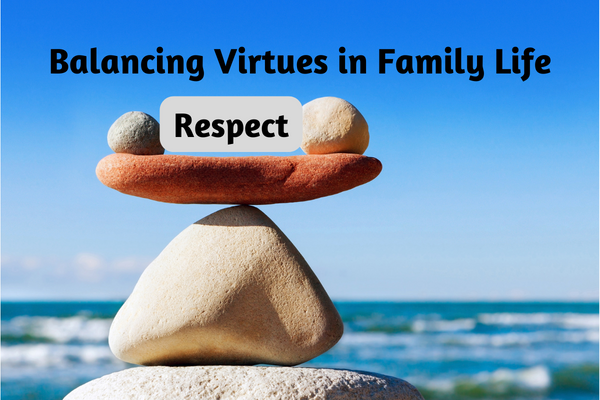
Developing Respectful Children
In raising children, few virtues are as vital as respect. It’s the cornerstone of harmonious relationships, the foundation upon which empathy and understanding thrive. But like any virtue, respect can be a delicate balance. In this blog post, we’ll explore the significance of developing respect in our children, the pitfalls to avoid, and strategies to encourage balanced respect in their personalities.

To bring out the best in children, look for those moments when they demonstrate respect and acknowledge that you see their respect. No big explanations or follow-up with “but”; just see it and acknowledge it. They have respect in full potential, and as a parent, you have the power to recognize that teachable moment.
Why Develop Respect in Children?
Respect is more than just a good manners lesson; it’s a lifelong skill that shapes children into compassionate, empathetic, and responsible individuals. Here’s why nurturing respect in children is crucial:
1. Stronger Relationships: Respect forms the basis of healthy relationships. Children who respect others tend to build trust and deeper connections with peers, adults, and authority figures.
2. Conflict Resolution: Respect equips children with the tools to resolve conflicts peacefully. When they understand the value of differing opinions and feelings, they can communicate effectively and find mutually beneficial solutions.
3. Empathy and Kindness: Respect is closely linked to empathy and kindness. By respecting others, children learn to appreciate their feelings, which, in turn, fosters acts of kindness and compassion.
4. Self-Respect: Encouraging respect for others often goes hand in hand with nurturing self-respect. Children who value themselves are more likely to make positive choices and maintain healthy self-esteem.
Pitfalls to Avoid
Developing respect in children requires careful guidance to avoid common pitfalls.
1. Authoritarian Approaches: Relying solely on authority and control to demand respect may yield compliance but doesn’t nurture genuine respect. Children need to understand the reasons behind respectful behavior.
2. Overly Permissive Parenting: On the other hand, allowing children to act without consequences or considering the impact on others can lead to a lack of respect for rules, boundaries, and other people’s feelings.
3. Lack of Role Modeling: Children learn by example. If they don’t witness respect in their parents and caregivers, instilling this virtue in them becomes challenging.
4. Inconsistency: Being inconsistent in enforcing respectful behavior can confuse children, making it difficult for them to understand the importance of respect in all situations.
Encouraging Balanced Respect
Balancing respect in children’s personalities involves a holistic approach that encompasses various aspects of their development:
1. Modeling Respect: Parents and caregivers play a pivotal role in modeling respect. Children observe and mimic the behavior they see. Treating others, including children themselves, with respect is the first step in nurturing this virtue.
2. Effective Communication: Encourage open and honest communication within the family. Teach children to express their thoughts, feelings, and opinions respectfully. Likewise, show them how to listen actively when others speak.
3. Empathy Education: Empathy is a natural companion to respect. Encourage children to consider the feelings and perspectives of others. Read books, watch movies, or discuss real-life scenarios that highlight the importance of empathy and understanding.
4. Consistent Boundaries: Establish clear and consistent boundaries that align with respectful behavior. When children understand the expectations and consequences, they are more likely to internalize respectful conduct.
5. Encourage Questions: Welcome your children’s questions and curiosity about the world. By encouraging them to seek understanding, you foster a mindset of inquiry and respect for knowledge and different viewpoints.
6. Problem-Solving Skills: Teach children problem-solving skills that incorporate respect for diverse opinions. Encourage them to brainstorm solutions that consider everyone’s needs and feelings.
7. Gratitude Practice: Promote gratitude within the family. Encourage children to express thanks and appreciation for the kindness of others. This fosters an attitude of respect for the efforts and contributions of those around them.
8. Teach Conflict Resolution: Teach children constructive ways to resolve conflicts. Help them understand that disagreements are natural but can be managed respectfully through active listening and compromise.
Championing a Balanced Approach
Balancing respect for children’s personalities is an ongoing process that requires patience and consistency. Here’s a balanced approach to helping your children develop respect in a healthy way:
1. Start Early: Instill respect from an early age. Teach even toddlers about gentle touching, sharing, and using polite words.
2. Set Expectations: Clearly outline your expectations for respectful behavior and the consequences for disrespect. Be consistent in enforcing these rules.
3. Encourage Questions: Create an environment where questions and curiosity are celebrated. Encourage your children to ask why things are the way they are and to explore different viewpoints.
4. Role-Play: Engage in role-playing scenarios where you and your child can practice respectful communication and problem-solving.
5. Praise Respectful Acts: Acknowledge and praise your child when they exhibit respectful behavior. Positive reinforcement can reinforce the value of respect.
6. Address Disrespect: When you observe disrespectful behavior, address it calmly and respectfully. Use it as a teaching moment to discuss why respect is important.
7. Teach Empathy: Share stories and examples illustrating empathy and kindness. Encourage your child to think about how others might feel in various situations.
Developing respect in children is a multi-faceted journey that requires guidance, patience, and consistency. Avoiding common pitfalls and nurturing balanced respect equips children with a lifelong virtue that enhances their relationships, communication, and empathy. It’s an invaluable gift that empowers them to navigate the complexities of life with grace and understanding. As parents and caregivers, we play a crucial role in shaping the respectful individuals of tomorrow, one respectful interaction at a time.
I invite you to sign up for our newsletter. It is a great way to get the Virtue of the Month and tips on relationships, parenting, and self-care. In addition, you’ll be the first to know about upcoming classes for successful families.
To sign up, visit the “Newsletter” section here on the website. Enter your email address, and you’ll receive our newsletter in your inbox on Wednesdays. I appreciate your interest in bringing out the best in your children and yourself. We look forward to keeping you informed through our newsletter!








